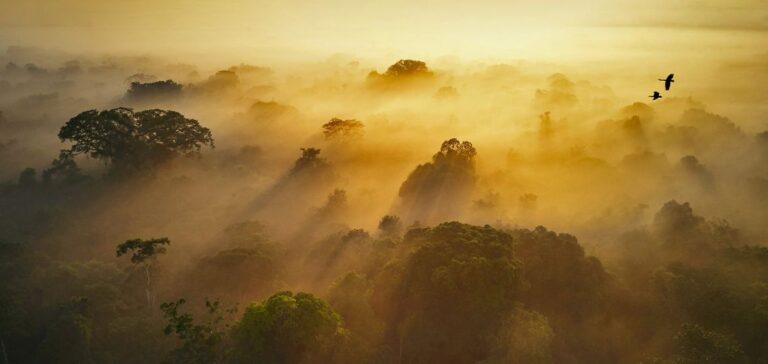For some, it’s a “wounded mother”, for others, a strategic piece of equipment to support the Ecuadorian economy.
Yasuni referendum: The crucial choice for the Amazon’s ecological and economic future
Yasuni Park is at the heart of an emblematic referendum on the future of oil exploitation on this indigenous Amazonian land, a unique reserve of biodiversity. Voters have been called to the polls for general elections, including an early presidential election, and will be asked to vote on the suspension of “Block 43”, considered to be the crown jewel of the state-owned Petroecuador company.
Last May, the country’s highest court finally authorized this national consultation, which had been called for ten years by an environmental group. It must decide on the future of this oilfield, known as “Block 43”, from which 12% of the 466,000 barrels/day produced in the country are extracted. The government, which tried unsuccessfully to oppose this consultation, estimates the losses at $16.47 billion over 20 years if the block were revoked.
Yasuni: Preserving the world’s lungs and saving the climate balance
“Yasuni has been like a mother to the world (…) We must unite our voices and our hands so that our mother recovers, so that she is not hurt, so that she is not beaten,” Alicia Cahuiya, activist and leader of the Waorani tribe, born in the heart of the thick rainforest, pleaded with AFP.
Historic territory of the Waorani indigenous people, the Yasuni is also home to the Kichwa, as well as the Tagaeri, Taromenane and Dugakaeri, the last communities living in voluntary isolation in Ecuador and fleeing modern civilization. For Ms. Cahuiya, Yasuni “is a lung for the world”.
Located between the provinces of Pastaza and Orellana, this 2.7 million hectare biosphere reserve, which includes the eponymous national park, captures carbon and then releases oxygen and water vapour, recharging the water sources.
“Water vapour helps maintain a low temperature on the planet, it’s like an air conditioner” for the atmosphere, Gonzalo Rivas, a scientist at the private Tiputini University, explained to AFP.
Overall, the Amazon basin has captured “around a quarter of all carbon emissions since the industrial era” and provides between “a quarter and a third of all the oxygen we use on the planet”, recalls Rivas. “This forest has enabled us to survive until today,” he asserts, echoing experts who warn that the Amazon is approaching the point of no return, i.e. that it will emit more carbon than it absorbs, an aggravating factor in climate change.
Yasuni : Towards an exemplary climate democracy supported by influential voices
Like many international stars, actor Leonardo Di Caprio, a passionate defender of the environmental cause, commented on Instagram in early August on this “historic opportunity for the Ecuadorian people to safeguard an important part of the Yasuni rainforest”. Swedish activist Greta Thunberg stressed the “critical importance” of Yasuni “for the Amazon basin and for the entire planet”. “This is what climate action is all about”.
For Amazon Frontlines, one of the NGOs spearheading the fight to defend the Amazon Basin, “the referendum is an unprecedented demonstration of climate democracy, where citizens, not corporations, decide on resource extraction and its limits”. The NGO sees this as an opportunity to “strike a decisive blow against the fossil fuel industry”.
Sustainable development under debate: Ecuador weighs up options for the “Block 43” deposit in the context of the Yasuni referendum
On a national scale, the debate focused mainly on the economic implications of the consultation. Block 43″, a young field which began production around ten years ago, “produces 57,000 barrels a day and the projection is to reach a peak of 90,000 in 2025”, explains Diego Navarrete, petroleum engineer and spokesman for Petroecuador.
Its current output is the fourth highest in the country, behind the former Sacha (72,000 barrels/day), Auca (71,000) and Shushufindi (62,000) fields, whose production is in decline. The government did not take part directly in the public debate, leaving Petroecuador in the front line, which argued that “block 43” contributes “around $1.2 billion to the general state budget”.
The company points out that to date, this deposit occupies just 80 hectares, whereas the entire Yasuni reserve covers almost a million hectares.
“No environmental accidents have been identified or reported”, and “the best protection practices are used”, assures Petroecuador, which constantly promotes “sustainable development”, “responsibility” and “harmony”.
On this issue, some divided indigenous people point to the accompanying measures for communities or the jobs guaranteed by Petroecuador. The latest polls published in July – banned on the eve of the referendum – gave a slight lead to the vote in favor of suspending production.






















